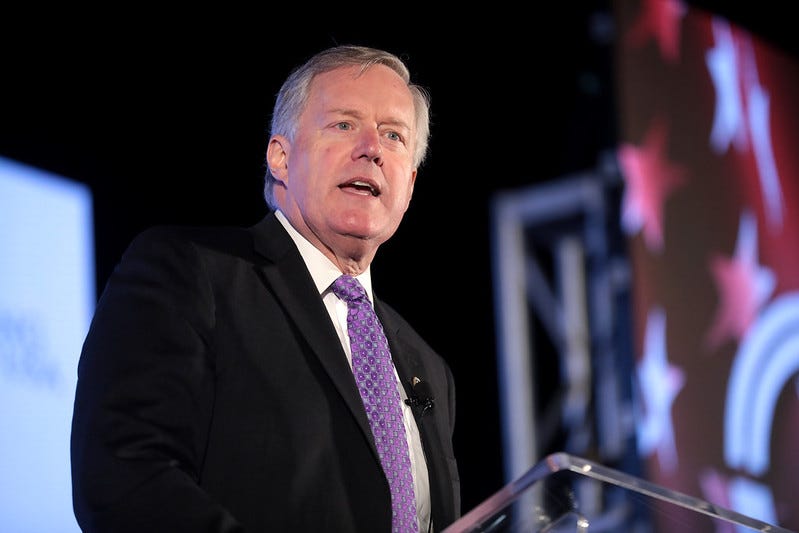Wake Up To Politics - December 14, 2021
Wake Up To Politics: What the Jan. 6 panel has learned
by Gabe Fleisher
Good morning! It’s Tuesday, December 14, 2021. Election Day 2022 is 329 days away. Election Day 2024 is 1,057 days away.
What the Jan. 6 committee has learned
The House select committee investigating the January 6 attack voted unanimously on Monday night to recommend former White House chief of staff Mark Meadows be held in contempt of Congress.
The full House will now take up the matter today; if the chamber votes to hold Meadows in contempt, it will be up to the Justice Department to decide whether or not to prosecute him. Meadows is the second former Trump aide to be held in contempt on the recommendation of the January 6 committee; the other, Steve Bannon, has since been indicted by DOJ.
Meadows is being held in contempt because he has refused to comply with a subpoena calling on him to testify before the panel — but before he did so, Meadows did briefly cooperate with the committee, forking over more than 9,000 pages of records.

Here are the three major takeaways from those documents:
1. Meadows was intimately involved in efforts to overturn the 2020 election. The records show that Meadows’ involvement was deeper than previously known in efforts to push members of Congress and state legislators to overturn the election results and re-install Trump in the White House against the popular will.
Throughout the transition, Meadows was in touch with activists pushing debunked theories about the 2020 vote, and with lawmakers to encourage them to act on those theories. One of the records obtained by the committee was a PowerPoint sent to Meadows that laid out ways to subvert the election, including by declaring a national emergency and seizing ballot boxes.
2. Meadows was also involved in planning the January 6 rally that preceded the Capitol riot. The committee obtained texts between Meadows and the organizers of the rally that took place just before the Capitol was violently raided — showing the extent of White House involvement in planning the event.
In one message on January 5, Meadows indicated that the National Guard would be on standby to “protect pro Trump people” during the rally the following day.
3. Meadows fielded texts from several pro-Trump personalities during the Capitol riot encouraging the president to speak up. Before the vote last night on whether to recommend Meadows for contempt, select committee vice chair Liz Cheney (R-WY) read aloud several messages that Meadows received as the Capitol riot worsened, showing how Trump refused to act despite receiving depictions of the violence from some of his closest allies.
The texts came from Republican lawmakers, Fox News hosts such as Laura Ingraham and Sean Hannity, and even the president’s son Donald Trump Jr. “The president needs to stop this ASAP,” one lawmaker told Meadows, although Trump waited hours before encouraging the rioters to stand down. “These text messages leave no doubt,” Cheney said. “The White House knew exactly what was happening here at the Capitol.”

The Meadows documents underline just how much the January 6 committee is learning about an extraordinary chapter in U.S. history, in which a sitting president sought to stay in power by overturning the results of an election and then hundreds of his supporters violently stormed the Capitol to try to help him.
According to a series of tweets from Cheney, the committee has already met with nearly 300 witnesses and is conducting “multiple depositions and interviews every week.”
The panel has also been busy fighting multiple legal battles; last week, they scored a preliminary victory in one, as a federal appeals court rejected Trump’s efforts to shield his White House records from the committee. (Trump is expected to appeal the ruling to the Supreme Court.)
At the same time as the investigation has continued, pro-Trump Republicans across the country have announced campaigns for key election administration offices — laying the groundwork for Trump allies to wield more power over elections come 2024, and possibly succeed where the 2020 efforts failed.
“This investigation is not like other congressional inquiries,” Cheney said during the panel’s Monday meeting. “Our Constitution, the structure of our institutions and the rule of law, which are at the heart of what makes America great, are at stake.”
What else you should know
→ Covid. Pfizer’s antiviral drug to treat Covid-19 was found to be 89% effective at preventing high-risk people from being hospitalized or dying from the virus, the company announced this morning.
→ SCOTUS. The Supreme Court refused to block New York’s vaccine mandate for health workers on Monday, rejecting a suit from some workers who had religious objections.
→ Afghanistan. No U.S. military personnel will be disciplined for the Kabul air strike in August that killed 10 civilians, the Pentagon indicated on Monday.

Policy Roundup: Education
Every Tuesday, Wake Up To Politics contributor Kirsten Shaw Mettler offers an overview of the week’s top education news:
Can states refuse to provide aid to religious schools? Maine allows students in rural areas without designated high schools to either attend nearby public schools or receive tuition aid for “nonsectarian” private schools. Two families in Maine are challenging this rule, saying that they want tuition to support sending their children to religious schools.
The Supreme Court reviewed this case on Wednesday and appeared to signal their support for including religious schools in such programs. The court ruling in favor of religious institutions would be no surprise, given other recent verdicts. For example, the Supreme Court recently ruled that Philadelphia could not ban a Catholic social services agency from screening foster parents, even though they refuse to work with same-sex couples, and that teachers at religious schools do not receive the same employment discrimination protections as workers at other institutions.
Schools are adding days off and switching to remote learning due to staffing shortages and burnout. Many teachers say they are overwhelmed after having to deal with learning loss, COVID-19 precautions, political debates, and more. Schools are worried that more teachers will resign if they don’t intervene, so many have added more time off — half-days, extended vacations, shortened weekly schedules — in order to get ahead of the problem.
But these moves have angered parents: They worry that the increased time out of the classroom will harm students who have already been virtual for so long. And more practically, some families are struggling to find childcare for the increased days off, especially when schools make these announcements on short notice.

More education policy headlines, via Kirsten:
As of next fall, Ohio State University and Smith College will no longer include student loans in their aid packages, instead using grant aid to support their students. For months, the Biden Administration has promised to cancel $10,000 of student debt per person, but there has been little progress.
A banned book showdown continues to wage in Texas, with one politician producing a list of 850 books he doesn’t think should be in libraries.
The National Education Association has been in the spotlight throughout the pandemic, especially on social issues.
Corrections
Two corrections from Monday’s newsletter: Inflation in the U.S. rose 0.8% in November, and 6.8% over the 12 months ending in November. (I mixed up the metrics.)
Also, the ABC/Ispos poll mentioned in the newsletter found that 57% of Americans disapproved of President Biden’s handling of the economy and 41% approved. (I mistakenly wrote “disapproved” twice.)
My apologies for the errors, and thanks to the readers who pointed them out!
Daybook
All times Eastern.
→ President Joe Biden and Vice President Kamala Harris will receive their daily intelligence briefing at 10:05 a.m. Then, at 11:30 a.m., Harris and Treasury Secretary Janet Yellen will deliver remarks and participated in a moderated conversation at the Freedman’s Bank Forum.
Finally, at 6:15 p.m., Biden and Harris, along with First Lady Jill Biden and Second Gentleman Doug Emhoff, will attend a holiday party to benefit the Democratic National Committee (DNC). Biden and Harris will deliver remarks.
→ White House Press Secretary Jen Psaki will hold a daily press briefing at 1 p.m.
→ The Senate will convene at 10 a.m. and resume debate over the nomination of Samantha Elliott to be a U.S. District Judge for the District of New Hampshire. At 11 a.m., the chamber will hold a cloture vote to advance her nomination, followed by a cloture vote on S. 1605, the National Defense Authorization Act (NDAA), and a motion to proceed to the as-yet-released joint resolution to raise the debt ceiling.
The chamber will then hold debate on the debt ceiling resolution; a final vote is also expected later in the day.
→ The House will convene at 12 p.m. The chamber is scheduled to vote on two high-profile pieces of legislation:
H.R. 5665, the Combating International Islamophobia Act, which would create a State Department special envoy position to monitor and combat Islamophobia around the globe. (The bill was introduced in response to anti-Muslim comments made by a Republican congresswoman.)
The resolution to hold former White House chief of staff Mark Meadows in contempt of Congress for refusing to comply with a subpoena from the House select committee investigating the January 6 attack.
The chamber may also vote on other pieces of legislation throughout the day, including the joint resolution to raise the debt ceiling.
→ Congressional leaders will hold a moment of silence at 5:15 p.m. on the Capitol steps to honor the 800,000 Americans who have died due to COVID-19. House Speaker Nancy Pelosi (D-CA), Senate Majority Leader Chuck Schumer (D-NY), House Minority Leader Kevin McCarthy (R-CA), and other lawmakers will participate.
→ The Senate Banking Committee will hold a hearing at 10:15 a.m. on cryptocurrency.
→ The House Select Subcommittee on the Coronavirus Crisis will hold a hearing at 2 p.m. on distributing COVID-19 vaccines across the globe.
→ The Supreme Court will not meet today.
→ Washington, D.C. Attorney General Karl Racine will hold a press conference at 12 p.m. to make a “major announcement regarding the January 6 insurrection and those responsible for it.” Del. Eleanor Holmes Norton (D-DC) and Anti-Defamation League CEO Jonathan Greenblatt will also be in attendance.



